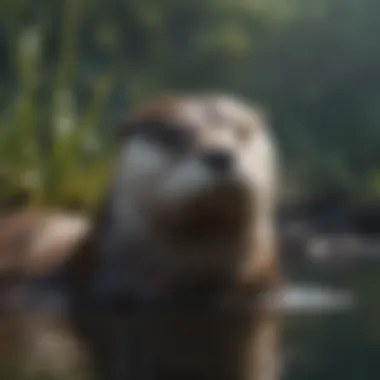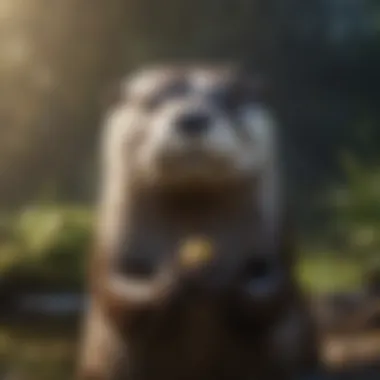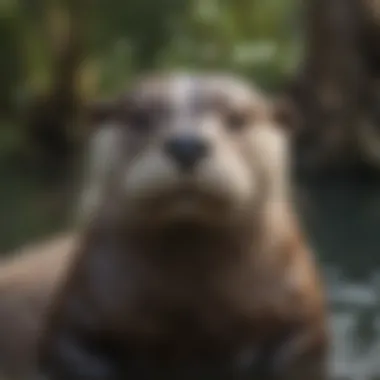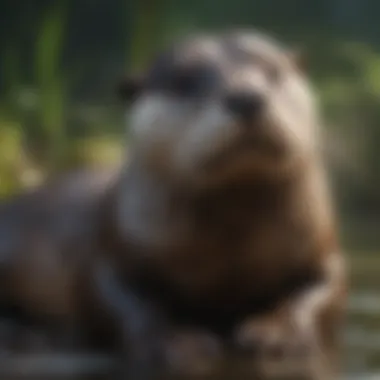Delving into Otter Ownership: Legal, Ethical, and Practical Considerations


Pet Care Essentials
As an owner of an otter, it is crucial to understand the daily nutrition requirements to ensure the well-being of your exotic companion. Otters have specific dietary needs that include a mix of proteins, fats, and carbohydrates for optimal health and energy levels. Incorporating a varied diet consisting of fish, shellfish, and occasionally small mammals can help meet their nutritional needs.
When it comes to exercise and playtime, otters are highly active animals that require plenty of physical and mental stimulation. Providing opportunities for swimming, interactive play, and exploring their surroundings is essential to keep your otter engaged and healthy. Incorporating enriching activities into their daily routine can prevent boredom and behavioral issues.
Grooming tips for otters involve regular grooming sessions to maintain their sleek and waterproof fur. Otters are known for their meticulous grooming habits, but as a pet owner, you should assist in keeping their coat clean and free of debris. Brushing their fur gently and providing occasional baths can help keep your otter looking and feeling their best.
Regular health and wellness check-ins are imperative for otter owners to monitor their pet's overall well-being. Scheduling routine veterinary visits for vaccinations, health screenings, and dental care is essential in preventing potential health issues and ensuring your otter lives a long and healthy life.
Behavior & Training
Understanding your pet's body language is key in building a strong bond with your otter. Otters communicate through various gestures, sounds, and postures, which can convey their emotions and needs. Learning to interpret these cues can help you respond appropriately and address your otter's requirements effectively.
Basic training techniques such as positive reinforcement and consistent rewards can be beneficial in teaching your otter desired behaviors. Patience and consistency are essential when training otters, as they are intelligent creatures that respond well to positive reinforcement and interactive training sessions.
Behavioral concerns like territoriality and excessive digging can arise in otters, requiring proactive solutions. Providing ample enrichment, setting boundaries, and redirecting negative behaviors can help address these concerns and foster a harmonious relationship between you and your otter. Socialization tips involve introducing your otter to various environments, animals, and experiences to ensure they feel comfortable and confident in different settings.
Pet Home Environment
Creating a pet-friendly space for your otter involves designing an environment that mimics their natural habitat. Offering a water source for swimming, opportunities for foraging, and engaging toys can enhance your otter's quality of life. Implementing safety measures to prevent escape, exposure to toxins, and accidents is crucial in ensuring your otter's well-being.
Choosing the right toys and accessories for your otter can stimulate their mental and physical abilities. Items like floating toys, puzzle feeders, and interactive games can keep your otter entertained and mentally stimulated. Setting up a comfortable resting area with soft bedding and privacy can provide your otter with a safe and cozy retreat.
Pet Health Issues


Recognizing signs of illness early on is vital in addressing health issues promptly. Monitoring your otter's eating habits, activity levels, and behavior can help detect any potential health concerns. Implementing preventative care measures such as regular veterinary check-ups, proper nutrition, and parasite control can safeguard your otter's health.
Common ailments in otters can include respiratory infections, gastrointestinal issues, and parasite infestations. Understanding the symptoms, treatments, and preventive measures for these conditions can help you effectively manage your otter's health. Being prepared for emergencies by having a first aid kit, emergency contact information, and knowledge of basic first aid procedures is essential for any otter owner.
Understanding Otters
In this article, Understanding Otters holds paramount significance. By delving into the intricacies of otter behavior, habitat needs, and legal aspects, we unravel a comprehensive guide to whether owning an otter is ethically and practically viable. Understanding Otters provides a foundational understanding necessary for those intrigued by the notion of keeping otters as pets. This section sheds light on the specific elements that make otters unique as companions, the benefits and challenges that come with otter ownership, and the ethical considerations that are crucial when contemplating otter companionship.
Otter Species Overview
The Otter Species Overview offers a detailed glimpse into the diverse world of otters. From the playful and social behavior of the North American River Otter to the elusive and nocturnal habits of the Asian Small-Clawed Otter, each species possesses unique characteristics that distinguish them. Understanding the various otter species is essential in making an informed decision regarding otter ownership. This section delves into the physical traits, habitats, and conservation status of different otter species, providing valuable insights into the responsibilities that accompany caring for these charming creatures.
Behavioral Traits of Otters
Exploring the mutable Behavioral Traits of Otters unveils a captivating picture of their intelligence and adaptability. Otters exhibit a wide array of behaviors, from sophisticated tool usage to intricate social structures within their family groups. Understanding these behavioral nuances is crucial in creating a suitable environment that meets their cognitive and social needs. This section delves into otters' communication methods, foraging techniques, and playful nature, offering a holistic view of what to expect when considering otter ownership.
Habitat Requirements for Otters
Determining the Habitat Requirements for Otters is vital in ensuring their physical and psychological well-being. Otters are semi-aquatic mammals that thrive in diverse aquatic environments, necessitating specific conditions to mimic their natural habitats. From freshwater rivers to coastal estuaries, each otter species has distinct habitat preferences that must be met in captivity. This section outlines the essentials of building an enriching habitat for otters, including water quality parameters, enclosure size considerations, and environmental enrichment strategies.
Legality of Otter Ownership
In this section, we delve into the crucial aspects of the legality of otter ownership. The ownership of otters raises complex legal questions due to their classification as exotic animals. When discussing the legality of otter ownership, it is essential to consider the various laws and regulations that govern the possession of such animals. Understanding these legal frameworks is paramount for anyone contemplating the idea of having an otter as a companion.
One significant element to ponder regarding the legality of otter ownership is the protection of both the otters themselves and the general public. These laws aim to prevent the exploitation and mistreatment of otters while also safeguarding individuals from potential dangers associated with owning exotic pets. By adhering to legal standards, both otters and owners can be ensured a safe and appropriate environment.


Additionally, the legality of otter ownership extends beyond mere guidelines – its implications can affect various aspects of an owner's life. From acquiring permits to facing potential legal consequences, navigating the legal landscape of otter ownership requires meticulous attention to detail. Compliance with these regulations is not only a legal obligation but also a moral responsibility towards these fascinating creatures.
Laws and Regulations Governing Otter Ownership
When exploring the laws and regulations governing otter ownership, one encounters a diverse array of legislative measures aimed at protecting otters and regulating their ownership. These laws dictate the specific conditions under which individuals can own otters, covering aspects such as housing requirements, veterinary care standards, and permissible interactions with the animals.
The legislation surrounding otter ownership varies by region, with some jurisdictions imposing stringent restrictions to ensure the welfare of these animals. By familiarizing oneself with the relevant laws, prospective otter owners can make informed decisions and provide suitable care for their potential companions.
Moreover, these regulations serve as a means of promoting responsible pet ownership and environmental conservation. By upholding the legal mandates pertaining to otter ownership, individuals contribute to the preservation of otter populations and the ecosystems they inhabit.
Exotic Pet Permits and Licensing
Obtaining exotic pet permits and licensing is a pivotal step in the process of owning an otter. These permits are essential for legal compliance and indicate that the owner has met the necessary requirements for caring for an exotic animal like an otter.
The acquisition of these permits entails a thorough assessment of the owner's capacity to provide adequate housing, nutrition, and enrichment for the otter. Additionally, licensing authorities may conduct inspections to ensure that the living conditions meet the specified standards.
Furthermore, possessing the relevant permits demonstrates a commitment to responsible pet ownership and adherence to regulatory standards. Through this licensing process, authorities can monitor and regulate otter ownership, thereby safeguarding the well-being of these captivating creatures.
Ethical Considerations
Ethical considerations play a crucial role in the discourse surrounding otter ownership. As individuals ponder the possibility of having an otter as a companion, it is imperative to delve into the ethical dimensions of this decision. The ethical considerations encompass a myriad of facets, ranging from the well-being of the otters in captivity to the broader implications of exotic pet ownership on wildlife conservation efforts. By exploring these ethical considerations, individuals can develop a more nuanced understanding of the impact of their choices on otters and the environment. The discussion on ethics serves as a cornerstone in this article, providing a foundation for readers to reflect on the moral implications of otter ownership.
Impact of Captivity on Otters
The impact of captivity on otters is a topic that warrants careful attention. When otters are kept in captivity, they face a range of challenges that can affect their physical and psychological well-being. From limited space for natural behaviors to the stress of confinement, otters in captivity may experience a decline in overall health. Understanding how captivity impacts otters is essential for individuals considering otter ownership. By recognizing the potential consequences of captivity, individuals can make informed decisions that prioritize the welfare of these charismatic creatures.


Alternative Ways to Support Otter Conservation
While owning an otter may not be feasible or advisable for most individuals, there are alternative ways to support otter conservation efforts. Engaging with ethical sanctuaries and rescues that focus on otter rehabilitation and protection can be a meaningful way to contribute to otter welfare without the complexities of ownership. Additionally, volunteering for otter conservation programs allows individuals to actively participate in efforts to safeguard otter populations and their habitats. By exploring these alternative avenues, individuals can make a tangible difference in otter conservation while respecting the inherent value of wild otter populations.
Challenges of Owning an Otter
Some people may be intrigued by the idea of owning an otter due to their captivating charm and playful demeanor. However, before embarking on such an endeavor, it is crucial to comprehend the challenges that come with otter ownership. These challenges go beyond the financial aspects and delve into the intricacies of providing adequate care and creating a suitable environment for these highly intelligent creatures.
When considering the challenges of owning an otter, one of the primary focal points is the financial responsibilities associated. Caring for an otter necessitates a significant financial commitment, encompassing expenses for food, veterinary care, and habitat maintenance. Otters have specific dietary needs and medical requirements that must be met to ensure their well-being, adding to the overall cost of ownership.
Specialized diet and care needs represent another critical challenge for otter owners. Otters have unique dietary preferences, primarily consisting of a diverse array of seafood. Ensuring that they receive a nutritionally balanced diet can be demanding, requiring careful planning and access to quality food sources. Additionally, otters need a stimulating environment that caters to their natural behaviors, including opportunities for swimming and play.
Apart from the financial and care-related challenges, otter ownership also entails significant interaction and socialization demands. Otters are highly social animals that thrive on companionship and mental stimulation. Owners must dedicate ample time to engage with their otter companions, fostering a strong bond built on trust and mutual understanding. Failure to meet their social needs can lead to behavioral issues and negatively impact the otter's well-being.
Alternatives to Owning an Otter
When considering the complex decision of owning an otter, it is crucial to explore alternative avenues that align with ethical and responsible practices. This section aims to shed light on the significance of exploring alternatives to direct ownership, emphasizing the welfare and conservation of these charismatic animals. By delving into these options, individuals can contribute positively to otter well-being without the challenges and responsibilities of personal ownership.
Visiting Ethical Sanctuaries and Rescues
Engaging with ethical sanctuaries and rescues dedicated to otter care and rehabilitation presents a meaningful way to interact with these creatures ethically. Visitors have the opportunity to observe otters in a safe and controlled environment, learning about their behavior and the importance of conservation efforts. Supporting these sanctuaries through visits not only educates individuals but also aids in funding critical otter welfare initiatives, ensuring these animals receive the care they need while maintaining their autonomy and wild nature.
Volunteering for Otter Conservation Programs
Volunteering for otter conservation programs offers a hands-on approach to contribute actively to otter preservation. Individuals passionate about wildlife and conservation can immerse themselves in projects aimed at protecting otter habitats, conducting research, and raising awareness about these vulnerable species. Through volunteering, individuals can make a tangible difference in otter conservation, promoting a sustainable future for these animals and their ecosystems. Joining such programs not only enriches one's understanding of otters but also fosters a sense of fulfillment by being part of positive change in the natural world.
Conclusion
Owning an otter is a complex endeavor that requires meticulous consideration. Whether considering the legal aspects, ethical implications, or practical challenges of otter ownership, each facet demands careful evaluation. The conclusion of this discourse on otter ownership encapsulates the significance of such contemplation. It serves as a culmination of the various intricacies elucidated throughout the article, providing a decisive and enlightened viewpoint on the feasibility of keeping an otter as a companion. The reader is urged to reflect on the multifaceted nature of otter ownership, weighing the joys and responsibilities it entails. This definitive juncture reinforces the necessity for informed and conscientious decision-making when contemplating otter ownership.
Final Verdict on Otter Ownership
For those pondering the prospect of otter companionship, the final verdict on otter ownership resounds with clarity. It is essential to recognize that owning an otter is not merely a whimsical notion but a serious commitment laden with considerations. From financial investments to specialized care requirements, the decision to own an otter necessitates profound dedication and preparedness. The final verdict underscores the essence of responsible animal stewardship, emphasizing the imperative of prioritizing the wellbeing and welfare of otters above all else. While the allure of having an otter as a pet is undeniable, it is paramount to approach this decision with sobriety and insight, ensuring that the best interests of these charming creatures are safeguarded at all times.







